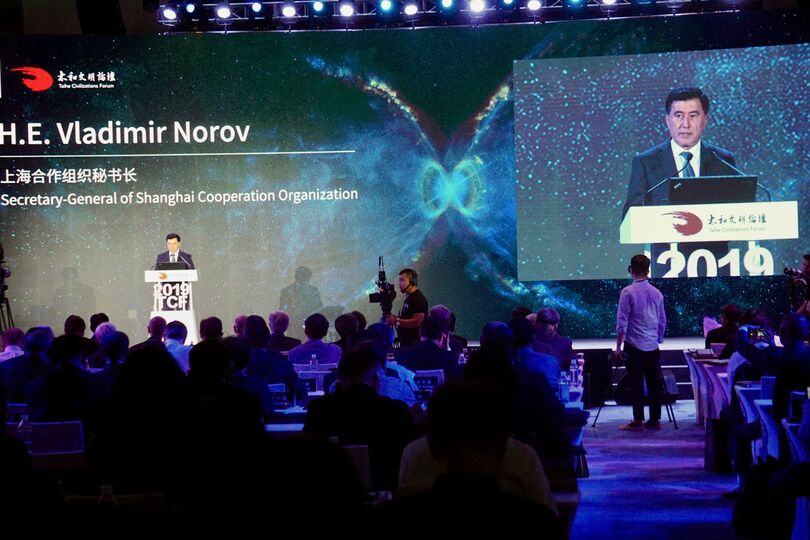Secretary-General of the Shanghai Cooperation Organisation, Vladimir Norov, took part in the 3rd Taihe Civilisations Forum ‘Science Culture, Future Ethics and Common Values' between 6 and 8 September 2019. The event's agenda focused on questions related to the global order, identifying the key trends in today's international relations, and security challenges associated with the Belt and Road Initiative.
In his remarks at the forum's opening session, Vladimir Norov said that its organiser, the Taihe Institute, has every right to be regarded as one of the leading and prominent think tanks in China that brought together the best Chinese and international experts and enabled them to share their experience and to find answers to the most complex challenges the world is facing today.
In this context the SCO Secretary-General noted that when the bipolar world order came apart, SCO member states succeeded in building neighbourly relations of mutual trust and respect. According to the speaker, the SCO's development is underpinned by the adherence by its members to the Shanghai Spirit.
He noted the importance of discussing at the forum the role of education and culture in today's world. "Being educated, attaining a certain cultural level and learning to respect other opinions and to compromise are all prerequisites for understanding events, developments, processes and being able to cross-reference information and rely on verified facts only," he pointed out.
Mr Norov went on to highlight the need to reflect on the implications of the explosive development of information and communication technology, including AI and smart IT technology. He believes that "the main question today is to understand what comes first, whether technology serves people or people are mere attributes of an IT platform that invades their privacy."
At the same time, the SCO Secretary-General stressed that resolving security matters is a priority failing which development at any level becomes impossible. "Without security there would be no trade, exchanges or contacts," he said.
During his remarks at a panel discussion Security and Development of the Belt and Road, Mr Norov noted that the Belt and Road Initiative is designed to improve the existing trade and transport corridors and to create new ones in order to connect more than 60 countries across three continents, making it a global undertaking. He also said that promoting connectivity between the Eurasian Economic Union and the Belt and Road Initiative is expected to elevate trade and economic cooperation across Eurasia to a new level and to ensure its radiant future.
Mr Norov pointed out that the SCO is proactive in promoting the alignment of the Belt and Road Initiative with national economic development strategies in Central Asia, offering these countries opportunities for obtaining direct and streamlined access to sea ports.
Mr Norov noted that the accession of India and Pakistan to the SCO strengthened the organisation, creating new opportunities for building a single space across the SCO and covering more than 3 billion people or 42 percent of the global population, and a market with abundant natural resources. He also recalled that SCO member states are involved in creating North-South and East-West transport corridors that are expected to serve as important transit routes linking European countries, the Caspian Sea region, the Persian Gulf, Central Asia, South Asia and Southeast Asia. He also stressed the importance of the SCO Agreement on Facilitation of International Road Transport, which provided a legal framework for transport companies enabling them to carry out cross-border shipments from Eastern Europe to China's eastern coast without any barriers.
According to the SCO Secretary-General, the next step in this direction would be to coordinate instruments on road development, create an integrated transport management system and promote closer ties between railway operators across the SCO.
Mr Norov placed special emphasis on the fact that the Belt and Road Initiative greatly enhances the SCO's role, especially in geopolitical and geoeconomic terms. "The SCO guarantees peace and stability within its area of responsibility, without which major infrastructure projects would be impossible," he said before quoting PRC President Xi Jinping whereby "the pursuit of the Belt and Road Initiative requires a peaceful and stable environment."
The SCO Secretary-General stressed that against this backdrop the organisation could play a more prominent role in helping the international community come up with effective collective approaches to tackling regional and global challenges. He also noted SCO's proactive contribution to getting young people involved in creative undertakings designed to strengthen people-to-people dialogue among them across the SCO, promote capacity building and shield them from pernicious influence of terrorist and extremist forces.
In conclusion, Mr Norov said that the SCO calls for strengthening the central role of the UN Security Council as the main body responsible for international peace and security. He believes that "ensuring security in a broader sense means building a culture of international relations based on trust, taking into consideration each other's interests, seeking mutually acceptable compromises, refraining from interfering in domestic affairs of others, and respecting the right to determine the political and socioeconomic development course on one's own. There is no doubt that SCO members states will succeed in their efforts to ensure security, peace and prosperity for our countries and people."
